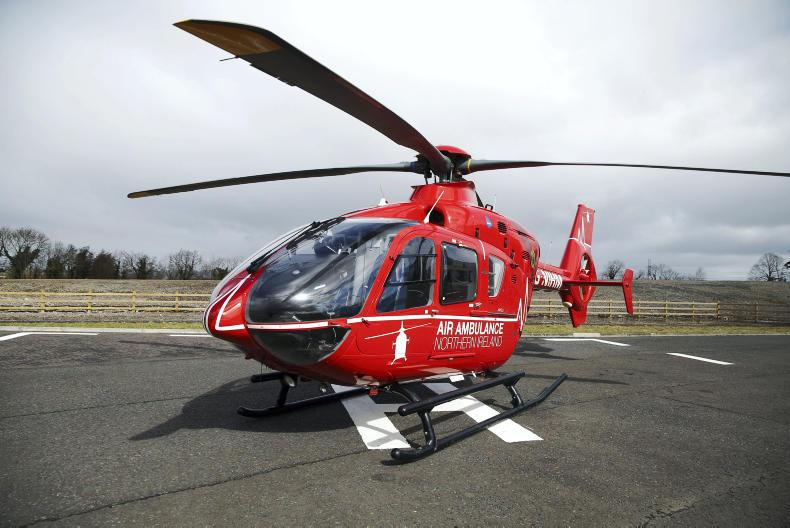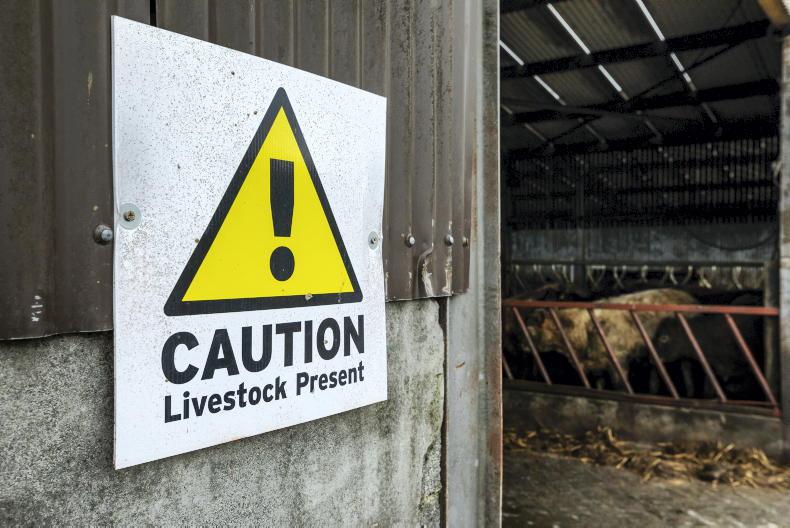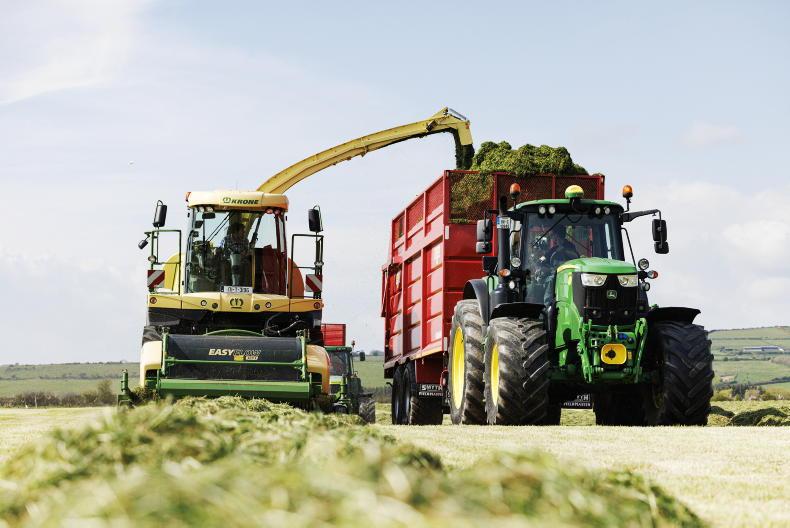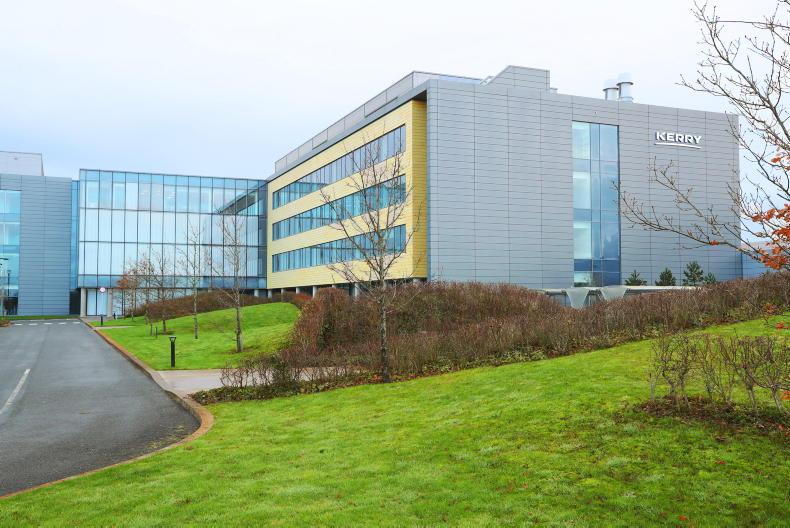Since becoming operational in July 2017, Air Ambulance NI (AANI) has helped prevent fatalities on local farms, paramedic and AANI operations manager Glenn O’Rourke told the Irish Farmers Journal.
He points out that farm accidents often take place in remote areas with limited road access or rough terrain, meaning paramedics in a traditional road ambulance can be delayed in reaching the casualty.
“Time is life. It is about getting the medical team to the patient and delivering those lifesaving interventions. If we can get there within those vital few minutes and take over body functions, then that patient does have a chance,” O’Rourke said.
AANI is based at the Maze near Lisburn and the on-board doctor and paramedics can reach any part of NI within 25 minutes. “From my own personal experience of seeing this first hand, it is certainly making a difference,” O’Rourke said.
The air ambulance has been to more than 600 incidents in the 18 months it has been operational. The first casualty the crew treated was an 11-year-old boy who had been injured by a tractor in a farm accident in Co Down in July 2017.
All emergency calls to the ambulance service in NI are now screened by a trained paramedic to assess the severity of the incident and decide if the air ambulance should be deployed.
“We realised very early on that patients on farms tend to have substantial and, in some cases, catastrophic injuries. We lowered the threshold to these calls to make sure that we can get there as a timely response because most of them are serious injuries,” O’Rourke said.
Funding
AANI is a registered charity and has substantial fundraising targets that need to be met from public donations to maintain the service. The air ambulance works in partnership with the NI ambulance service which allows all medical staff and equipment to be provided to AANI free of charge.
“It leaves us with £2m that needs to be raised on an annual basis to sustain everything in relation to the helicopter operations. We have one operational helicopter and another one that is used for training and back-up to minimise any down time,” AANI head of fundraising Kerry Anderson said.
The public donations are also needed to cover costs associated with fuel, insurance, offices, hangers to store the helicopters as well as clothing and other equipment for staff.
“We need the public support to ensure that we can build up to a point of raising £5,500 every day to sustain the service in the long term,” Anderson said.
For its 100-year anniversary, the Ulster Farmers’ Union (UFU) had a high-profile fundraising campaign for AANI and it has surpassed its initial target of collecting £100,000 for the service.
Anderson said the UFU campaign is the largest fundraising partnership that AANI has had to date and, aside from the money, it has been beneficial in raising the profile of the air ambulance, leading to other fundraising initiatives.
“The farming community has really got behind AANI and raised funds and awareness of the charity,” she said.
Challenge
But there are a lot of £100,000s in £2m and in 2018 AANI is forecasting to come in below its fundraising target, with £1.1m expected to be raised.
“We are on a growth journey. Remember, this charity is starting from scratch a couple of years ago. It takes time to raise awareness and support. We have a four-year business plan in place and we are in year two currently, so we have a couple of years to grow that income,” Anderson said.
“We are confident with continued support from the public, the business sector and growing our membership that we will do that. Other air ambulances on the same model have been going for a long time. For example, Cornwall air ambulance has been running for over 30 years,” she added.
Anderson said AANI will continue to look to farming, sports, faith and social groups as a means of raising funds. The agribusiness sector is also being approached by AANI about financially supporting the service.
Individuals can sign up to become a member of Club AANI through the air ambulance’s website. There are more than 400 members registered so far, which involves a £2 donation to the service each week.
“This is a charity that could save your life or the life of a loved one someday. It’s a service worth supporting,” said Glenn O’Rourke.
Read more
Responding to an on-farm medical emergency
Farm safety: what I learned on a two-day chainsaw safety course
Since becoming operational in July 2017, Air Ambulance NI (AANI) has helped prevent fatalities on local farms, paramedic and AANI operations manager Glenn O’Rourke told the Irish Farmers Journal.
He points out that farm accidents often take place in remote areas with limited road access or rough terrain, meaning paramedics in a traditional road ambulance can be delayed in reaching the casualty.
“Time is life. It is about getting the medical team to the patient and delivering those lifesaving interventions. If we can get there within those vital few minutes and take over body functions, then that patient does have a chance,” O’Rourke said.
AANI is based at the Maze near Lisburn and the on-board doctor and paramedics can reach any part of NI within 25 minutes. “From my own personal experience of seeing this first hand, it is certainly making a difference,” O’Rourke said.
The air ambulance has been to more than 600 incidents in the 18 months it has been operational. The first casualty the crew treated was an 11-year-old boy who had been injured by a tractor in a farm accident in Co Down in July 2017.
All emergency calls to the ambulance service in NI are now screened by a trained paramedic to assess the severity of the incident and decide if the air ambulance should be deployed.
“We realised very early on that patients on farms tend to have substantial and, in some cases, catastrophic injuries. We lowered the threshold to these calls to make sure that we can get there as a timely response because most of them are serious injuries,” O’Rourke said.
Funding
AANI is a registered charity and has substantial fundraising targets that need to be met from public donations to maintain the service. The air ambulance works in partnership with the NI ambulance service which allows all medical staff and equipment to be provided to AANI free of charge.
“It leaves us with £2m that needs to be raised on an annual basis to sustain everything in relation to the helicopter operations. We have one operational helicopter and another one that is used for training and back-up to minimise any down time,” AANI head of fundraising Kerry Anderson said.
The public donations are also needed to cover costs associated with fuel, insurance, offices, hangers to store the helicopters as well as clothing and other equipment for staff.
“We need the public support to ensure that we can build up to a point of raising £5,500 every day to sustain the service in the long term,” Anderson said.
For its 100-year anniversary, the Ulster Farmers’ Union (UFU) had a high-profile fundraising campaign for AANI and it has surpassed its initial target of collecting £100,000 for the service.
Anderson said the UFU campaign is the largest fundraising partnership that AANI has had to date and, aside from the money, it has been beneficial in raising the profile of the air ambulance, leading to other fundraising initiatives.
“The farming community has really got behind AANI and raised funds and awareness of the charity,” she said.
Challenge
But there are a lot of £100,000s in £2m and in 2018 AANI is forecasting to come in below its fundraising target, with £1.1m expected to be raised.
“We are on a growth journey. Remember, this charity is starting from scratch a couple of years ago. It takes time to raise awareness and support. We have a four-year business plan in place and we are in year two currently, so we have a couple of years to grow that income,” Anderson said.
“We are confident with continued support from the public, the business sector and growing our membership that we will do that. Other air ambulances on the same model have been going for a long time. For example, Cornwall air ambulance has been running for over 30 years,” she added.
Anderson said AANI will continue to look to farming, sports, faith and social groups as a means of raising funds. The agribusiness sector is also being approached by AANI about financially supporting the service.
Individuals can sign up to become a member of Club AANI through the air ambulance’s website. There are more than 400 members registered so far, which involves a £2 donation to the service each week.
“This is a charity that could save your life or the life of a loved one someday. It’s a service worth supporting,” said Glenn O’Rourke.
Read more
Responding to an on-farm medical emergency
Farm safety: what I learned on a two-day chainsaw safety course









SHARING OPTIONS